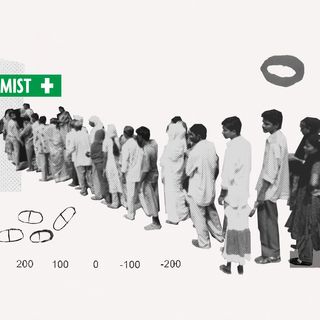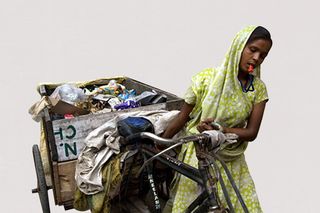
Sanitation Workers on the Frontlines of the Pandemic Are Overlooked, Unprotected
“We are exposed to lethal bacteria and viruses on daily basis, and we need to take care of ourselves.”

Pinki Sonwane, a 34-year-old garbage collector, collects garbage from more than 20 houses in Sakalnagar, Pune, without a mask, apron, gloves, or boots. Sonwane, who is yet to receive any instructions on how to protect herself against Covid19 from her employer, Pune Municipal Corporation (PMC) and Swatch, has been collecting garbage with her bare hands before and even after the Covid19 outbreak. She has to segregate garbage, some containing used masks, into wet and dry.
“People throw away used masks on road or in garbage boxes. Why cannot they pack it in bags or paper and throw?” Sonwane says. “I get scared of getting infected with COVID19. Why don’t government instruct people how to dispose these masks? I have stopped hugging my daughter, Ankita, and son, Mandar, as I feel if I am infected they would get infected as well. I stopped touching [my] husband.”
Following the outbreak of Covid19 in India, sanitation workers across India are worried. They expected the government to provide safety gear — masks, gloves, soaps, sanitizers, and boots – as well as instructions on how to protect against the infection.
However, even though sanitation is on the list of essential services, requiring Sonwane and her associate to continue to work even as the rest of their cities and states shut down, no state or central government has announced safety measures for sanitation workers, who are at forefront of risk for Covid19.
As per Prohibition of Employment of Manual Scavenging and their Rehabilitation Rules 2013, sanitation workers should be given protective gear and devices to use while cleaning and collecting. All gear is to be checked after six months and, if needed, to be fixed or replaced. But even before the pandemic hit, this regulation was seldom followed.
“We are exposed to lethal bacteria and viruses on daily basis, and we need to take care of ourselves.”
Ramchandra Varad, who is directly and permanently employed by the PMC, pushes carts with two big bins. He uses gloves to sort wet and dry garbage from the heap into each respective bin. He received the gloves, along with a mask, a year ago – but both were damaged within a week. “I have bought [new] gloves for my safety,” Varad says. “We are exposed to lethal bacteria and viruses on daily basis, and we need to take care of ourselves. Despite several demands and strike, PMC official did not pay attention.”
PMC officials did not reply to requests for comment by the time of publication.
More than 5 million sanitation workers work in urban India across nine broad categories, as per a study, “The hidden world of sanitation workers in India,” authored by Dalberg Advisors and published by the World Bank, Water Aid, and the International Labour Organization, in 2018. The categories include cleaning sewers, cleaning latrines, fecal sludge handling, railway cleaning, waste treatment, public and private toilet cleaning, sweeping, and domestic work.
As per the report, most sanitation workers are not registered with local bodies or the government; sanitation is primarily a privatized industry that relies on unorganized freelancers to which governments outsource work. Without registration or direct employment with the government, sanitation workers are not eligible for even the negligible protections Varad can avail. Instead, these unofficial sanitation workers come in physical contact with hazardous waste without protection and equipment. Three sanitation workers die every five days while countless suffer due to health issues. On Wednesday, a contractual sanitation worker on the outskirts of Delhi died from inhaling chemical fumes during a cleaning drive aimed at limiting the spread of Covid19.
As per a survey of 200 Mumbai sanitation workers carried out in 2015 by Tata Institute of Social Sciences, 69.9% of them were given safety measures – of those, all saw their gear damaged within a week; gloves were torn, disposable masks ran out, boots didn’t fit, and hand sanitizer and soap are seldom provided. The city did not replace the damaged or missing gear.
Jayashri Bhadkawad, a colleague of Sonwane, has noticed a changed attitude of house owners from whom she collects garbage. “Unlike earlier, they don’t talk, don’t offer tea or water, or ask to come inside house,” Bhadkawad says. “They keep garbage bins outside and maintain 4 to 5 meters of distance.” These more affluent families might be following social distancing protocols recommended by experts to stop the spread of Covid19, but there’s an undercurrent of classist untouchability, too, that frustrates Bhadkawad. “All of them have either got holidays or work from home. And they will get their salaries anyway. If we don’t pick garbage we will not get money. If we don’t work, city will go rogue. These people are educated — why don’t they teach us or help us over how to take care of ourselves during the pandemic?”
The answer speaks to the heart of class – or, more properly, caste — divides in India. As per a survey by Participatory Research in Asia in 2019 across three districts — PRIA Ajmer, Jhansi, and Muzaffarpur — 100% of sanitation workers belong to the Valmiki caste or other scheduled castes; 70 to 80% of them are women.
Related on The Swaddle:
The Coronavirus Pandemic Holds a Mirror to Our Culture’s Shameless Classism
But that survey’s snapshot is indicative of the larger situation. “100% sanitation workers, barring rare [exceptions], are from scheduled caste and tribes. Apart from Delhi, all 12 states where work have not announced any protective step for sanitation workers,” says Dr. Pradip More, a human rights activist who works for the welfare of sanitation workers across 13 states in India. “If sanitation workers start getting infected [with Covid19] it will wreak havoc in the society. Gloves, masks, and sanitizers are important. I hope private players would come to help till government wakes up.”
Vimal Aadmane, dressed in a sari and without a single safety measure, sweeps a roadside near Nalla, in Pashan. People throw garbage or used masks while walking without noticing her presence or effort, she says. Aadmane, who earns Rs. 13,000 as a sweeper on a contract basis, says her gloves and masks got damaged long ago. “I don’t remember when I got soap [from] my PMC last time. I could not wear [the provided] boots that were of big size and uncomfortable,” she says. “We stay in slums and get limited water supply. I cannot take bath twice a day or clean house regularly [to avoid infection].”
Purushottam Waghela runs Manav Garima, a for welfare organization representing 17,000 sanitation workers in Ahmedabad. All workers belong to Valmiki community (SC) and most work informally in the private sector – which, like governments, are also not providing for the safety of their sanitation workers. ”Most of sanitation workers are in unorganized sector that is privately employed at malls, companies. They should be given medical facilities,” Waghela says. He has submitted a letter to the Gujrat government asking for that as well as for testing, subsidized food, and free medical treatment for both public and private sanitation workers who become infected with the coronavirus.
The lack of support and protection for sanitary workers was already taking a toll, even before the arrival of the Covid19 pandemic. The Centre for Education and Communication, in Delhi, conducted a study of life expectancy of sanitation workers, concluding very few live past 60 years; for most, life expectancy is closer to 50 currently.
On Sunday, at the urging of the Centre, Indians around the country made noise at 5 p.m. to honor the doctors, nurses, and other health care professionals on the frontlines of the pandemic. No mention of sanitation workers, who handle without protection or institutional support everything from individual waste to medical waste, was made by either government or media.
“Central and state government has made many announcement to contain spread of COVID 19. But not a single line has been uttered about sanitation workers who are at forefront of the risk,” says Bezwada Wilson, PhD, head of Safai Karmchari Andolan, an NGO dedicated to eliminating manual scavenging.
Varsha Torgalkar is an independent journalist based out of Pune. She covers social justice, gender, climate change, and travel for national and international news publications. She has covered the agrarian crisis in Marathwada and Vidarbha extensively and is interested in rural journalism. She holds a diploma in Journalism and a Master's degree in political science from Pune University. She is also an avid trekker and has successfully scaled Everest Base Camp, Annapurna Circuit Trek, and Goecha La.
Related


Unresponsive Helplines, Limited Testing Are Leaving People Suspicious of Their Covid19 Status
